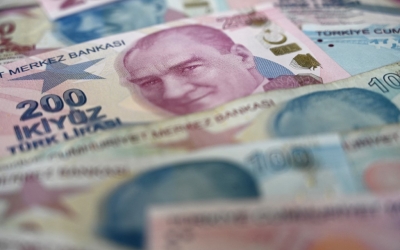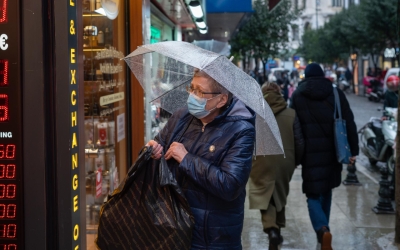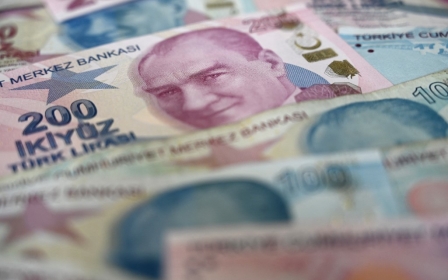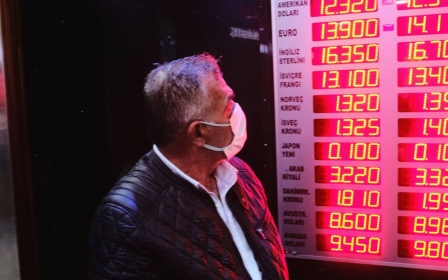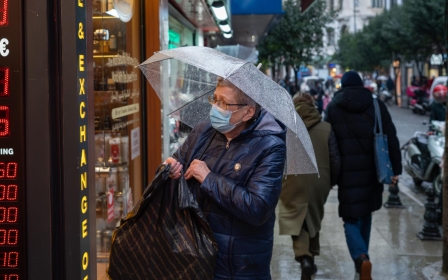Turkish lira: Caution and hope in Istanbul’s Grand Bazaar following new measures
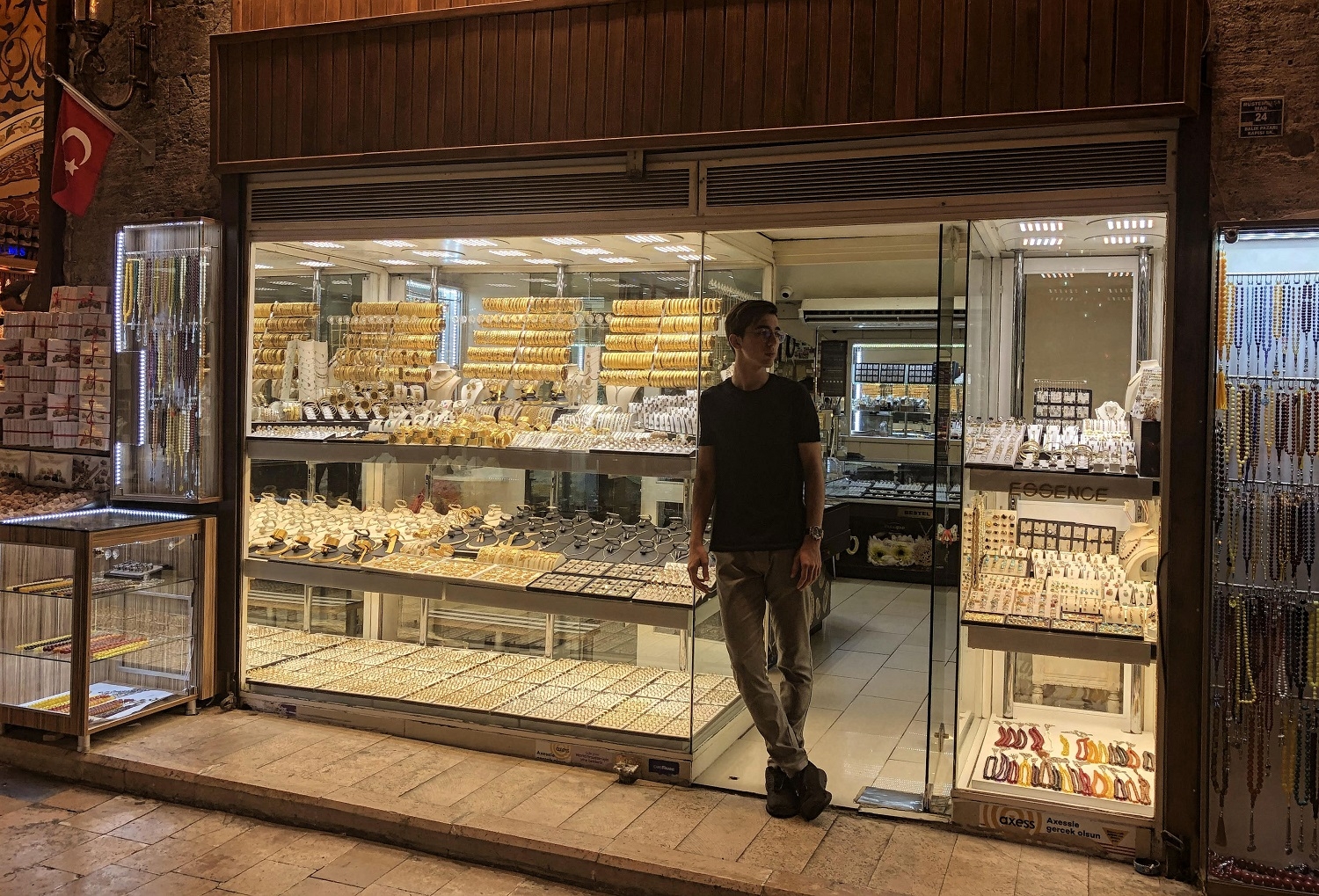
Late on Monday, Turkish markets witnessed an unprecedented movement in the dollar versus lira exchange rate, with the US currency depreciating by almost 30 percent.
In an unprecedented rally, the local currency rocketed following the introduction of new protective monetary measures for the lira that have raised tentative hopes among ordinary people.
By Thursday, the dollar stood at around 11 liras, having been above 18 before the measures.
Neither economists nor the elderly could remember having witnessed such a reversal which came after Turkey’s President Recep Tayyip Erdogan unveiled an array of measures designed at easing the devastating consequences of an accelerated currency crash over the past few weeks.
The primary aim of the move was to encourage citizens to hold liras instead of dollars in interest-bearing bank accounts, with the Central Bank and the Treasury guaranteeing to compensate any loss should the dollar gain more value over a determined period of either three, six or twelve months.
Labelled the "Turkish dollar" by some on social media, the new accounts appear to offer a no-lose scenario in which Turks are guaranteed to get the same return as forex markets, while if those markets drop below official interest rates, the investor will still get an official interest rate return.
The new financial instruments were available as of Wednesday in several public and private banks.
High margins
Istanbul’s Grand Bazaar and its adjacent neighbourhoods mark the heart of Turkey’s economy.
The bazaar alone sees volumes of at least $10m in forex transactions a day, sometimes rising to a few dozen million.
As the dollar sailed between 12.5 and 12.9 liras, the exchange offices were applying a huge margin between buy and sell prices, going up to as much as one lira.
Most of the exchange bureau owners and their workers were reticent to reveal whether ordinary Turks had flocked to the bazaar to sell their dollars and gold in return for liras.
One owner, smoking in front of his tiny bureau at the Grand Bazaar’s entrance, said: “We don’t know what is going to happen.
“So, we apply a high margin between the buy and sell prices in case the dollar goes up again.”
Whispered views
Contrary to expectations, there were no queues in the exchange offices.
Indeed, the Grand Bazaar and adjoining Altincilar street, in which dozens of exchange bureaus, along with gold and jewellery sellers, are situated, were not as crowded as usual.
On most days, it would be almost impossible to hear the person next to you, with hundreds of traders constantly buying and selling foreign exchange, gold and stocks, speaking so loudly on mobile phones that a buzzing would always be present.
Instead, the normal fervour of the traders was calm and cautious.
One of them said: “We don’t know whether these prices are permanent. What will happen if I sell the dollar over this price, and it goes up again?”
However, one silver seller whispered that they would never be happy when their revenues are not maximised.
The man, who exports finished silver products to Central Asian countries, said he had lost money since he had recently bought silver at a higher price.
“I’ve no chance to stock it and wait for it to increase to previous prices,” he said.
“But my loss is unimportant. For the first time in one year, people have hope for the future of the economy.”
More loans
Neither the exchange bureau owner, trader or silver seller wished to reveal their names or have their photos taken, citing security reasons.
Despite their caution, Hakan Aran, the general manager of Is Bank, one of Turkey’s largest banks, said on Tuesday that investors had sold $1.75bn in a single day, following Erdogan’s unveiling of the new financial tool.
According to the Central Bank, the number of lira deposited in the country’s banks had fallen below two billion lira as of 15 December, whereas deposits in dollars had above $3bn.
Last December, that number had been below $2bn. These figures, which do not even include gold or other foreign currency deposits, demonstrated how Turks had turned their back to the lira in preference for the dollar.
Now, the government believes that this money will be converted into lira and deposited in the new financial instruments.
In this way, the government foresees the Central Bank will increase its reserves of dollars, while the banks will be able to give loans to investors at lower rates.
'We need stability'
Bilal Guler is an importer of wood-made products and other souvenirs who runs a store in Istanbul’s Mercan district, close to the Grand Bazaar.
Guler, who buys the goods from Indonesia to sell in Turkey, says his business was heavily affected after the dollar briefly went above 18 liras.
“Our profit margin dropped to 20 percent from 60 percent due to the lira’s depreciation,” he told MEE.
“When we and our customers saw this depreciation, all of us converted our lira assets to dollars.”
However, Guler believes that the biggest problem is the volatility in the prices.
“The dollar can be 15 liras or 10 liras. It doesn’t matter much,” he said.
“We need stability in the FX markets so that we can make proper calculations and avoid unpredictable losses.”
He thinks that the latest measures fail to address the needs of business people like himself, since they do not have the luxury of being able to deposit their money for three months or more in the new financial instruments.
“[That said,] if ordinary people convert their money to lira and put it in the bank, we’ll benefit as well,” he added.
“It will be easier to take loans from banks. Also, I should state that low-interest rates are crucial for Turkey for further investments.
“All in all, we need stability. It’s good to see that the government is endeavouring to do something.”
'Positive atmosphere'
Meanwhile, Mercan and Tahtakale, another commercial centre near the Grand Bazaar, are not as busy as they used to be in previous years.
Although not deserted, the few tourists wandering around the stores, mixed in with some local shoppers, means the areas are a shadow of their former days.
Despite this, Guler’s caution, mixed with hope, is not uncommon.
Ibrahim Selcuk, who sells glassware and kitchen equipment to both the domestic market and abroad, said: “Erdogan, once again, proved his honesty and capability for creating solutions against problems whether they be political or economic.
“There is a positive atmosphere in the markets right now. In the last three months, manufacturers refused to sell anything due to the volatility over the dollar price.
“Despite our proposal to pay three times more than the standard price, they refused to sell. This government intervention is very appropriate, and even late.”
Selcuk says he has full confidence in Turkey’s future regarding its economic capacity, believing that Turkish goods are of better quality than Chinese.
“Turkey’s main problem is volatility. If we can keep the dollar at a certain level, then the markets will increase their turnover as people will know that the money in their pockets will not melt over a few months,” he said.
He also admitted that he had bought dollars and was in loss: “No problem. My loss is unimportant. We need hope more than money, now!”
Middle East Eye delivers independent and unrivalled coverage and analysis of the Middle East, North Africa and beyond. To learn more about republishing this content and the associated fees, please fill out this form. More about MEE can be found here.


